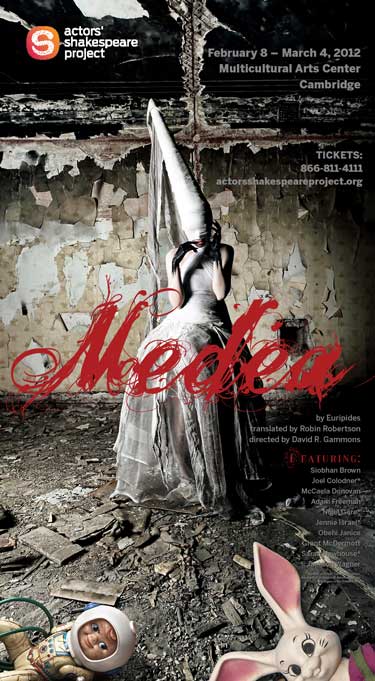
Promises are made and broken, that's when the rationale kicks in. Medea is a searing look at what we can do to each other when our lives are turned upside down. Euripides' classic brings us a frighteningly contemporary look at the dark depths of human nature and how the wounds of betrayal can push us to dangerous places beyond all measure.
Press
-
David R. Gammons' staging and Susan Dibble's choreography connect the women's plight to Medea's actions. Medea's crime could cause repercussions in the community and encourage more abuse between the men and the women in Corinth. Actors' Shakespeare Project's production of Medea provides a truly human struggle that is not unlike “true crime” accounts of our present day. One wonders what will happen to Medea and Jason. Nothing is clearly resolved (unlike a Shakespearean tragedy where the main characters die). The consequences of their actions are still to be weighed.
-
This tragic drama is stark, cruel and direct. Unlike Shakespearean tragedy, with all of its ins and outs, and all of its intricate language, this is clear and to the point. We know what goes on and there is not too much dithering about it. … Here, in Medea, everything is tight from the outset and all one needs to do is to touch it to see everything fly apart. The catharsis that results is a kind of penetrating throb, one that does not work its way into much of a knot, but which simply hurts. And there is something so unremittingly harsh about Euripides' portrayal that nothing abates it. The current production transmits that harsh directness exceptionally well.
-
But an underlying theme of this generally admirable ASP production is the subtler truth that Medea is very much like “other women" in one crucial way: She is subject to the sudden, arbitrary, and unfair changes of circumstance that come of living in a world where men make (and remake) the rules to suit and benefit themselves. This implicit notion of Medea as universal woman - despite the monstrousness of her deeds - sustains an interesting tension in the well-acted production, directed by the ubiquitous David R. Gammons, who just wrapped up “Red" at SpeakEasy Stage Company. Israel, attired in a long black gown, delivers a harrowing performance that makes clear that when Medea challenges the established order in an act of murder, it is also an act, spiritually speaking, of self-slaughter.
Medea
By Euripides
Translated by Robin Robertson
- Directed by David R. Gammons
- Choreographed by Susan Dibble
- Scenic Design by Carlos Aguilar
- Lighting Design by Jeff Adelberg
- Costume Design by Lisa Polito
- Sound Design and Original Music by Cam Willard
Actors’ Shakespeare Project
Multicultural Arts Center, Cambridge, MA
February 8 - March 4, 2012
Photos: David R. Gammons











